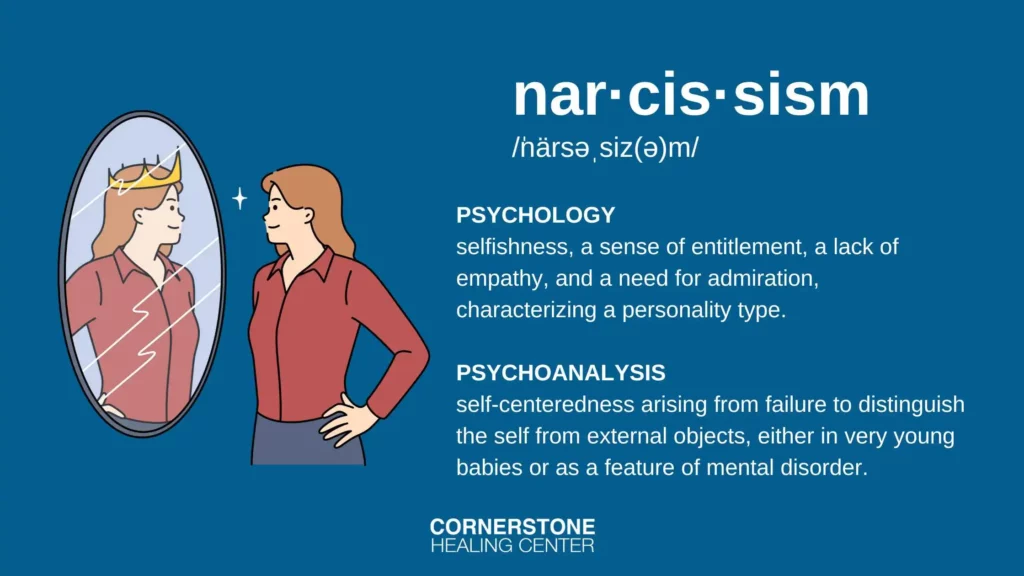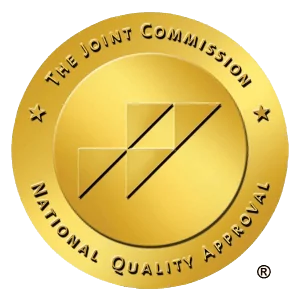Narcissism is a personality disorder that causes individuals to have an inflated sense of self-importance and an intense need for excessive attention and admiration.
This can create complex and challenging dynamics within families, significantly when narcissistic parents raise children.
Research shows that individuals who grew up with narcissistic parents are more susceptible to addictive behaviors in later life.
This article examines the profound impact of a narcissistic upbringing on one’s emotional well-being and how it often leads to addiction as a coping mechanism.

Understanding Narcissistic Parenting
Narcissistic Personality Disorder (NPD)
Narcissistic Personality Disorder (NPD) is a mental condition that is characterized by a consistent pattern of exaggerated self-importance, an excessive need for admiration, and a lack of empathy towards others.1
People with NPD often display a grandiose sense of self, a preoccupation with fantasies of limitless success, and a belief that they are unique or special.
They typically have fragile self-esteem and may react with anger or disdain if they do not receive preferential treatment or face criticism.
The Narcissistic Family Dynamic and Roles Children Play
In a family with a narcissistic dynamic, the relationships are typically imbalanced, with the primary goal of upholding the self-esteem of the parent with Narcissistic Personality Disorder (NPD).
Children in these families are often assigned specific roles that cater to the needs of the narcissistic parent.2
The Golden Child typically showered with praise and attention, is a paragon of perfection, yet often at the cost of immense pressure to maintain the family’s idealized image.
Contrastingly, the Scapegoat Child bears the brunt of the family’s dysfunctions, unfairly targeted for blame and criticism, which can lead to feelings of alienation and low self-esteem.
Often overlooked, the Invisible or Lost Child navigates a world of neglect, struggling for recognition and battling self-worth issues.
In an effort to win approval, the Hero or Responsible Child takes on a leadership mantle, striving to excel and often overburdening themselves.
Meanwhile, the Caretaker or Placater subjugates their needs to soothe the emotional volatility of the household, while the Mascot or Clown uses humor as a deflection tool, lightening familial tensions.
Lastly, the Mastermind or Manipulator Child, perhaps mirroring the narcissistic parent, may employ manipulation as a means of control or attention.
Each of these roles serves as a survival strategy within the unpredictable environment of a narcissistic family, impacting the children’s development and their future interpersonal relationships.
| Role: | Overview: |
|---|---|
| The Golden Child | Often the favorite child, they are perceived as perfect and can do little wrong in the eyes of the narcissistic parent, leading to high expectations and pressure to uphold the family’s ideal image. |
| The Scapegoat Child | Regularly blamed for family problems, this child bears the brunt of the parent’s negative emotions, often resulting in feelings of worthlessness and alienation. |
| Invisible/Lost Child | This child receives little attention or recognition, often feeling neglected. They may struggle with self-esteem and forming healthy relationships. |
| The Hero/Responsible Child | Often taking on a leadership role within the family, this child strives to excel and be responsible, frequently to gain approval and attention from the narcissistic parent. |
| The Caretaker/Placater Child | This child often caters to the emotional needs of the parent and other family members, setting aside their own needs in the process. |
| The Mascot/Clown Child | They use humor as a coping mechanism and often play the role of the entertainer in the family, sometimes to deflect tension or conflict. |
| The Mastermind/Manipulator Child | This child may adopt manipulative behaviors, often mirroring the narcissistic parent, as a way to gain control or attention within the family dynamic. |
Emotional and Psychological Effects on Children
Children who have narcissistic parents may experience a range of emotional and psychological effects.
They often receive love with certain conditions attached to compliance with the parent’s expectations, which can lead to issues with their self-worth and independence.
They may also suffer from emotional abuse, which includes manipulation, gaslighting, and emotional neglect, leading to anxiety, depression, and challenges with trust and relationships in adulthood.
The lack of genuine empathy from their parents may leave these children feeling misunderstood and lonely, which can have a severe impact on their emotional health and overall development.
| Signs of a Narcissistic Parent: |
|---|
| 1. Has an exaggerated sense of self-importance and entitlement |
| 2. Expects constant admiration and attention |
| 3. Lacks empathy for others, including their own children |
| 4. Envious of others or believes others are envious of them |
| 5. Belittles or undermines others to feel superior |
| 6. Uses manipulation or guilt to control family members |
| 7. Projects their own negative traits onto others |
| 8. Needs to maintain an image of perfection and expects the same from family members |
| 9. Reacts negatively to criticism or perceived slights |
| 10. Shifts blame and responsibility onto others |

The Seeds of Addiction: Emotional Void and Dysfunctional Coping
The Emotional Void: Lack of Parental Empathy and Validation
Children of narcissistic parents often grapple with an emotional void stemming from a profound lack of parental empathy and validation.
Narcissistic parents, preoccupied with their own needs and feelings, typically fail to recognize and affirm their children’s emotional states.
This neglect leaves the child with an internal emptiness, a yearning for the affection and recognition they did not receive in their formative years.
This void can persist into adulthood, manifesting as an ongoing search for the external validation missing in childhood.
Seeking Solace: How Children of Narcissists Learn to Self-Soothe
In the absence of parental comfort, children of narcissists often have to devise their methods of self-soothing.
These methods are developed to manage the stress and emotional turmoil experienced within the home.
While some children may find healthy coping methods, such as through creative expression or hobbies, others may turn to less adaptive strategies.
The foundation of these self-soothing practices can significantly influence their future coping mechanisms, including the potential development of addictive behaviors.
Dysfunctional Coping Mechanisms: Early Signs of Addictive Behavior
Dysfunctional coping mechanisms can arise when the normal, healthy regulatory processes fail to develop.3
In the context of narcissistic parenting, the child may begin to show early signs of addictive behavior as a misguided form of self-medication.
For instance, they may start by using food, video games, or social media compulsively to escape their emotional pain.
This pattern can later evolve into substance abuse or other addictions.
These behaviors are often a signal of the underlying distress, a symptom of the unaddressed and unresolved trauma of growing up with a narcissistic parent.
Risk Factors in Adulthood
Continuing the Cycle: How Untreated Trauma Leads to Adult Vulnerability
Untreated trauma from a childhood dominated by narcissistic parenting can significantly increase vulnerability in adulthood.
This vulnerability often manifests in the continued search for validation and love that was absent during the formative years, potentially leading to a cycle of dysfunctional relationships and behaviors.
Without proper intervention and healing, adults who were once children of narcissistic parents may find themselves replicating similar toxic patterns in their relationships, both personally and professionally, or they may struggle with boundary-setting, further perpetuating their trauma.
The Allure of Substances: Filling the Void Left by Narcissistic Abuse
Many adults who have endured narcissistic abuse may find themselves drawn towards addictive substances, such as drugs and alcohol.4
These substances can offer temporary relief from the deep-seated pain and emptiness that characterizes their emotional landscape.
While they may seem to provide a temporary escape, these substances ultimately fail to fill the void, leading to addiction as they become a maladaptive coping strategy to manage unresolved emotional distress.
Psychological Predispositions: Anxiety, Depression, and Low Self-Esteem
The psychological imprint of growing up with a narcissistic parent often predisposes adults to a spectrum of mental health challenges.
Anxiety may emerge as a hyper-vigilant response to the unpredictable moods and reactions of the narcissistic parent.
At the same time, depression may develop from feelings of worthlessness and hopelessness rooted in the persistent devaluation experienced in childhood.
Additionally, chronic low self-esteem is a common outcome due to the constant undermining of the child’s sense of self by the narcissistic parent.
These psychological predispositions create a fertile ground for addictive behaviors to take root as adults seek to manage their internal turmoil through external means, often without the awareness that they are repeating a cycle that began in their youth.
The Addiction Trap
Understanding the Nature of Addiction
Addiction is a multifaceted and often misunderstood condition that extends beyond physical dependence on substances or behaviors.
It is characterized by compulsive engagement in rewarding stimuli, despite adverse consequences.
This complex condition involves a combination of biological, psychological, and social factors.
It rewires the brain’s reward system and impairs an individual’s ability to exert control over their behavior, leading to a relentless cycle that can consume an individual’s life.
Addictive Behavior as a Learned Response
For children of narcissistic parents, addictive behavior can be a learned response to their environment.
The unpredictable and often hostile family dynamic can teach children to seek out immediate sources of comfort or escape, setting the stage for addictive patterns.
These behaviors are reinforced when they seemingly provide relief from emotional distress or a way to gain control in a life that feels uncontrollable.
Over time, these learned responses can become deeply ingrained, turning to automatic coping mechanisms that are difficult to break.
The Compounding Effect of Addiction on Pre-existing Psychological Wounds
Addiction can have a compounding effect on pre-existing psychological wounds, particularly for those with a history of narcissistic abuse.
The cycle of addiction can exacerbate feelings of shame, guilt, and worthlessness, which often stem from the narcissistic parent’s criticism and lack of validation.
As addiction progresses, it can lead to new traumas, including damaged relationships, professional decline, and financial hardship, all of which can deepen the emotional wounds that contributed to the addiction in the first place.
The individual becomes trapped in a vicious cycle where the addiction both numbs and intensifies their psychological pain, making recovery a complex process that requires addressing not just the addiction itself, but also the underlying emotional trauma.
Breaking Free: Recovery and Reclamation
Acknowledging the Root: The Importance of Recognizing the Source of Trauma
A crucial first step in the journey towards recovery is acknowledging and understanding the root cause of the trauma.
For those who have grown up with narcissistic parents, this means recognizing how these early experiences have shaped their perceptions, reactions, and coping mechanisms.
This awareness is vital, as it allows individuals to separate their own identity and worth from the distorted view presented by their narcissistic upbringing.
Acknowledging this source of trauma is often painful but is a necessary foundation for genuine healing.
The Path to Healing: Therapy and Support Systems
Healing from the complex trauma of narcissistic abuse often requires professional therapy.
Therapeutic approaches such as cognitive-behavioral therapy (CBT), dialectical behavior therapy (DBT), or trauma-informed therapy can be highly effective in addressing the deep-seated issues stemming from this type of upbringing.
In addition to these, other therapeutic modalities like Eye Movement Desensitization and Reprocessing (EMDR) and psychodynamic therapy have also shown promising results in treating trauma-related symptoms.
Group therapy can be particularly beneficial as it offers a space for individuals to share experiences and learn from others who have faced similar challenges.
Beyond professional therapy, support systems play a crucial role in the healing journey.
This can include the support of empathetic friends, family members, or finding community in support groups specifically for those affected by narcissistic abuse.
Peer support can provide a sense of understanding and validation that is often missing from the lives of those who grew up in narcissistic family environments.
Engaging in self-care practices, mindfulness, and building a network of supportive relationships are also integral to the process of healing and reclaiming one’s sense of self.
The path to recovery is unique for each individual, but with the right support and therapeutic guidance, resilience and growth are not just possible, but highly attainable.
Reclaiming Autonomy: Building Self-Esteem and Healthy Coping Mechanisms
Reclaiming autonomy involves developing a sense of self that is separate and independent from the narcissistic parent’s influence.
This process includes building self-esteem and recognizing one’s intrinsic value.
It’s about rewriting the narrative that was imposed in childhood to one that is self-defined.
Part of this journey involves developing healthy coping mechanisms to replace the maladaptive ones.
This can include mindfulness practices, establishing healthy boundaries, engaging in regular physical activity, and pursuing interests and passions.
These practices not only help in managing stress and emotional pain but also foster a sense of self-efficacy and control over one’s life, which is often missing in the lives of those who have been subjected to narcissistic abuse.
Prevention and Awareness
Educating about Narcissistic Parenting and Its Long-term Effects
Education plays a pivotal role in the prevention of the long-term effects of narcissistic parenting.
By increasing awareness about the characteristics of narcissistic parenting and its potential impact on children, both individuals and professionals can better identify and address these issues early on.
This education can take place in various settings, including schools, healthcare facilities, and community centers, and should aim to inform parents, teachers, and healthcare providers about the signs of narcissistic abuse and its psychological repercussions.
Understanding these dynamics is the first step in breaking the cycle and mitigating the potential for future addictive behaviors and other related mental health issues.
Strategies for Parents and Communities to Recognize and Prevent Addiction
Preventing addiction in the context of narcissistic parenting involves proactive strategies both at home and in the wider community.
Parents, even those who may not exhibit narcissistic traits, can benefit from learning positive parenting techniques that emphasize empathy, validation, and emotional support.
Community-wide efforts can include programs and workshops that teach effective communication, emotional intelligence, and coping skills to both parents and children.
Schools and community organizations can play a vital role in providing resources and safe spaces for children to express themselves and learn healthy ways of managing stress and emotional pain.
Addressing the Challenges Faced by Children of Narcissistic Parents
Children of narcissistic parents navigate a complex emotional landscape marked by a unique set of challenges that can have profound long-term effects.
Understanding and addressing these underlying issues is crucial in preventing the development of addictions and other related mental health concerns.
It is imperative that we, as a society, increase our awareness and extend support and resources to those affected by this form of upbringing.
By doing so, we not only empower individuals to break free from the cycle of trauma but also foster a healthier, more compassionate community that recognizes and responds to the nuances of such experiences.
If you or a loved one is struggling with addiction, please reach out to us at Cornerstone Healing Center in Scottsdale, AZ.
As an addiction treatment center that prioritizes trauma-focused care, we specialize in dual diagnosis and embrace holistic healing methods to foster enduring recovery.
Our approach is designed to address the root causes of addiction, ensuring a more comprehensive and sustainable healing journey.
Let us be the support you need on your path to long-term recovery!







